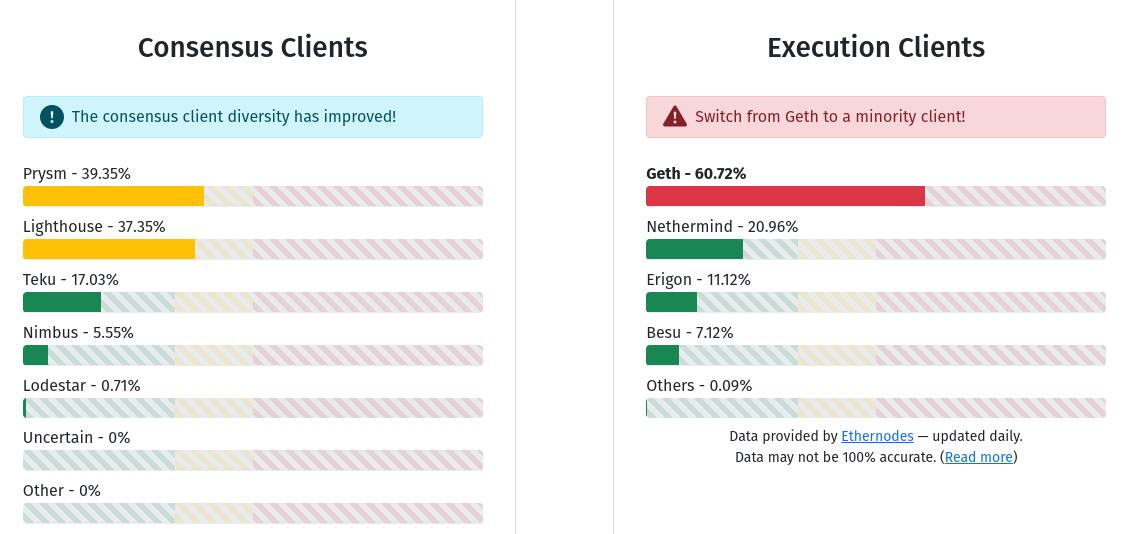Vitalik Buterin reveals major challenge for Ethereum’s future – and how to solve it

Ethereum co-founder Vitalik Buterin shared his thoughts on the “under-discussed, but still very important” aspects of the Ethereum ecosystem in a recent blog post this weekend. bottom.
A post titled “How does Ethereum’s multi-client philosophy interact with ZK-EVM?” We focus on solutions.
Zk-EVM multi-client issue
Vitalik believes ZK-EVM will evolve to become an integral part of Ethereum’s Layer 1 security and verification process in the future. Zero Knowledge (ZK) technology allows developers to prove the authenticity of a transaction or message without revealing additional information. Thus, one party can convince the other that the message is true without disclosing knowledge beyond the validity of the message.
However, the privacy-enhancing nature of ZK technology could disrupt the broader EVM landscape, as Ethereum clients differ subtly in their implementation of protocol rules, according to Ethereum co-founders.
ZK Rollup’s Layer 2 protocol successfully used ZK proofs to help Ethereum scale by bundling multiple transactions into a single proof. However, as ZK-EVM evolves to verify execution on the mainnet, “ZK-EVM is effectively a third type of heir that is as important to the security of the network as execution clients and consensus clients. will be an Ethereum client for
Considering ZK-EVM as a third type of Ethereum client, Vitalik raises the following questions:
“How do we actually create a “multi-client” ecosystem for proving the legitimacy of Ethereum blocks on ZK?”
As the ecosystem grows, Vitalik hopes to leverage ZK-EVM’s capabilities to improve the scalability, security, and decentralization of the Ethereum network, while maintaining the benefits of its “multi-client philosophy.”
According to Vitalik, the main technical challenges in using ZK technology with multiple clients relate to latency and data inefficiencies. Furthermore, each individual he Ethereum client handles zero-knowledge proofs differently due to the specific interpretation of the protocol rules or his ZK-EVM implementation.
ZK-EVM Multi-Client Solution
Despite these challenges, Vitalik believes creating an open multi-client ZK-EVM ecosystem is feasible and beneficial for Ethereum security and decentralization.
Below is a visual representation of the various clients used in the consensus and execution layers of the Ethereum ecosystem.

Vitalik says having multiple clients improves network security and decentralization by reducing the risk of a single catastrophic bug in one implementation that can lead to an entire network outage. claimed. In addition, the multi-client philosophy helps prevent concentration of power within one development team or organization and promotes political decentralization.
Vitalik presented three potential solutions to the problem as shown below.
- “Single ZK-EVM: Abandon the multi-client paradigm and choose a single ZK-EVM to use for block verification.
- Closed Multi-ZK-EVM: Agreeing on a particular set of ZK-EVMs, establishing consensus, and requiring proof from more than half of the ZK-EVMs in that set for a block to be considered valid It has a consensus layer protocol rule called .
- Open Multi-ZK-EVM: Different clients have different ZK-EVM implementations, and each client waits for proof compatible with its own implementation before accepting a block as valid. ”
In the context of ZK-EVM, Vitalik supports the idea of an open multi-client ZK-EVM ecosystem. Each client has his ZK-EVM implementation different, and each client waits for a proof compatible with itself before accepting a block as valid.
“To me, (3) seems ideal. At least until we can formally prove that all ZK-EVM implementations are equivalent to each other, until the technology improves…”
However, as the technology improves to the point where ZK-EVM implementations are somewhat standardized, Vitalik argued that the solution would be to choose the most efficient option.he said, “challenge [for option 3] It looks like a smaller challenge than the other two options, at least for now. ”
Vitalik also nodded at recent rapid advances in AI, saying that advances in AI could “supercharge” the development of proofs of ZK-EVM implementations.
“In the long run, of course, anything can happen. We will step up formal verification until





